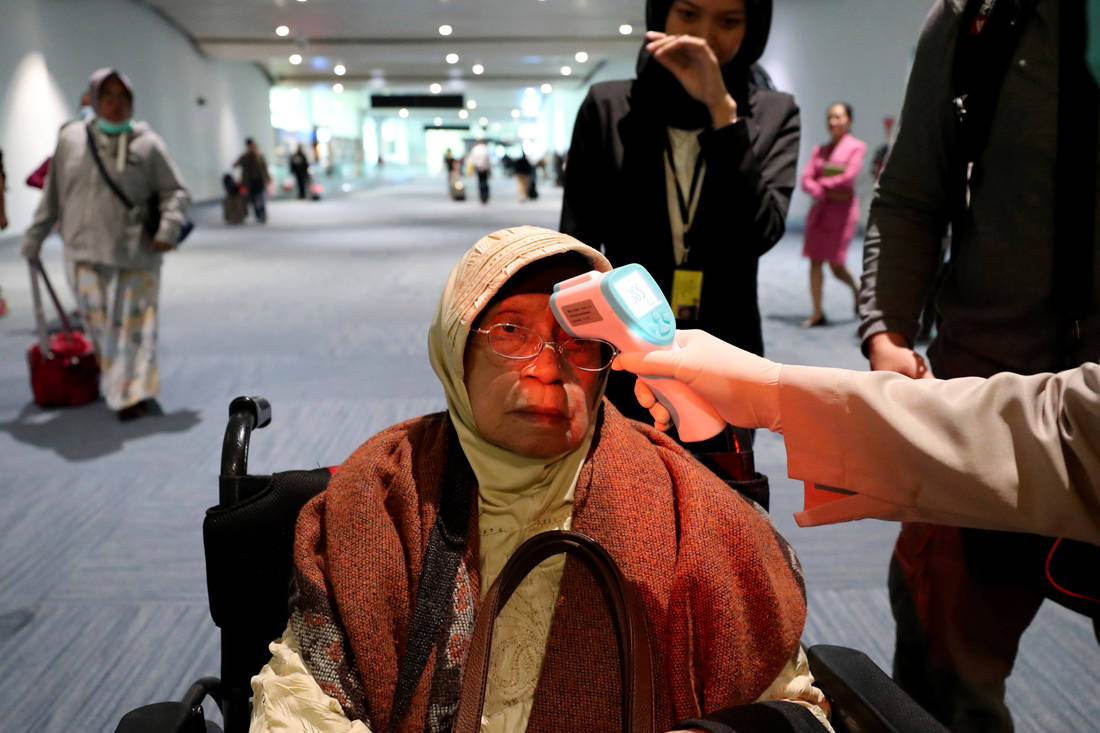With the coronavirus already in Europe, after the two confirmed cases in France, there is concern all over the world while there are fears that the virus may appear in Greece. But what is the coronavirus (2019-nCoV)? How is it transmitted and how can we protect ourselves in order to stay healthy? These are the main questions that concern everyone.
It is essentially a new virus that belongs to the category of coronaviruses, which together with rhinoviruses are the ones that cause colds. In fact, it was named so because if seen under a microscope refers to a crown. It started in China making its first appearance in December 2019 in Wuhan. It has claimed the lives of at least 26 people (as of Friday night 24/1) and has affected hundreds of people. He is considered much more serious than his predecessors as he came from a mutation that made him stronger and more resistant to drugs.
The World Health Organization (WHO) announced on Thursday (23/1) that it was "too early" to rule that the virus was a "public health emergency of international concern".
What are the symptoms of coronavirus?
Symptoms mainly include fever and difficulty breathing, as well as the general public cold.
The characteristic of the new coronavirus, however, is that it can cause serious complications such as:
- pneumonia
- gastrointestinal problems (vomiting and diarrhea)
- renal failure.
 World health authorities fear that the rate of transmission will accelerate as hundreds of millions of Chinese travel home and abroad during the weekly Chinese New Year holiday that began on Saturday (25/1). So far no vaccine has been found for the virus and there is evidence of its transmission through it respiratory road.
World health authorities fear that the rate of transmission will accelerate as hundreds of millions of Chinese travel home and abroad during the weekly Chinese New Year holiday that began on Saturday (25/1). So far no vaccine has been found for the virus and there is evidence of its transmission through it respiratory road.
Preliminary research has so far shown that the virus was transmitted to humans by snakes, but Chinese government health adviser Jong Nanshan says it may have started in badgers and rats.
Is there a risk of spreading in our country? What do Greek doctors answer to newsbeast.gr
The newsbeast.gr came in contact with doctors who explain if the coronavirus can reach Greece while at the same time advising citizens what to do to stay safe.
Η Mina Balaska, ISTM Certificate in Travel Health, Infectious Diseases, said: "The emergence of an epidemic, caused by a new virus, has always been a challenge for Public Health. The dynamics of the spread of this epidemic is not yet completely predictable, because the scientific data is incomplete. "According to the ECDC (European Center for Disease Prevention and Control), the risk of the new virus spreading to the general public in Europe from imported cases of travelers is very small at present." "Travelers visiting China, especially the city of Wuhan, should take the following precautions: good hand washing, hygiene when handling food, avoid eating raw or undercooked animal products, avoid visiting fresh markets meat or animals, avoid contact with dead animals or animal excrement, and avoid contact with patients with respiratory symptoms. "Those travelers who show symptoms of respiratory disease, should seek immediate medical attention," he added.
The infectious disease specialist Petrikos Panagiotis He pointed out that Greeks should not be particularly worried unless they were to travel to countries mainly in the Middle East. "Because it is a holiday season in China, there will be a mass movement of people from the country, so a wave of people can reach Europe. "So it is not unlikely that someone who has the symptoms of the virus will even come to our country," he said, adding: "I do not consider a virus to be so deadly if diagnosed immediately. We must not panic. It is a situation that even if we are called we will be able to face ".
Ο Ioannis Triantaphyllakis, Curator of General-Family Medicine and PhD candidate of the Medical School of the University of Ioannina stated: "The new coronavirus of the Middle East shows threatening moods. It can be transmitted from person to person with speech, coughing or sneezing droplets and the symptoms are usually those of the common cold. There is no specific treatment or vaccine and mainly precautionary measures are recommended, such as following hygiene rules. Greater attention should be paid to people belonging to vulnerable groups (elderly, patients with respiratory problems, immunosuppressed, pregnant women). He also explained that so far "the risk of introducing a case in Greece is considered low" and recommends that calm prevail and panic incidents be avoided. "The competent authorities must be vigilant in order to identify and quickly isolate suspected cases of illness, paying particular attention to the gates, airports and ports," he added.
Extraordinary measures in airports with thermal cameras and special areas
Most airports in the world have taken emergency measures to detect possible cases.
At its new airport Istanbul which is a major international hub, with more than 50 million passengers passing through it last year, and Turkish Airlines operates daily direct flights to China, including Beijing, Shanghai and Guangzhou, where thermal cameras have been deployed.

The situation is similar Heathrow Airport as 200.000 passengers pass through it daily, while dozens are transported from and to China flys.
The administration of Athens Eleftherios International Airport is in open communication with the National Organization of Public Health (EODY) and will take the necessary measures in case it is deemed necessary.
The epidemics that started in China in recent decades

2019: new coronavirus
In Wuhan city, Hubei province, in China, there has been an outbreak of pneumonia since December 2019. On January 9, 2020, the Chinese health authorities announced that he was a new coronavirus strain.
2003: SARS
The SARS (severe, acute respiratory syndrome) virus appeared in late 2002 in southern China after being transmitted from bats to humans through the masked palm cumin, a wild mammal sold live in Chinese markets for its meat. This coronavirus is highly contagious and causes acute pneumonia, which can be fatal in some cases.
Since the spring of 2003, he has been causing real psychosis in Asia, mainly in China, Hong Kong and Singapore. The World Health Organization declares March 12 an international health alarm.
Eventually, the epidemic will kill 774 people in 8.096 cases in 30 countries. China and Hong Kong account for 80% of all cases.
1997: Avian Influenza A (H5N1)
Avian influenza first caused deaths in Hong Kong in 1997 (six dead), before reappearing in 2003 in Southeast Asia, killing 282 people in 468 cases in 15 countries (WHO report 2003-2009).
However, this virus is endemic mainly to birds, and mainly to farmed birds, and human infection is due to direct contact with birds. Therefore, there can be no question of a human avian influenza epidemic, as human-to-human transmission is not possible or minimal. Fear stems from an evolution of the virus into a form that is easily transmitted from person to person.
1968: Hong Kong flu
A new type A virus (one of the three types of seasonal flu) has been transmitted since July 1968 in Hong Kong, infecting half a million people, or 15% of the population, before spreading to Asia, the US and reaching the autumn Europe.
It is considered the first pandemic of the modern era, the transmission conditions of which are exacerbated by the proliferation of air travel, and causes global mobilization, coordinated by the World Health Organization. Effective flu vaccines have been available since November 1969 Hong Kong. The pandemic has killed one million people, according to the US Centers for Disease Control and Prevention (CDC).
1957: Asian flu
The first cases of this influenza, also of type A, were detected in February 1957 in the Chinese province of Guizhou (southwest China). The virus spread to China and then to Asia and around the world causing the largest pandemic of the Spanish flu in 1918. The total death toll is estimated at 1,1 million people, according to the CDC.


